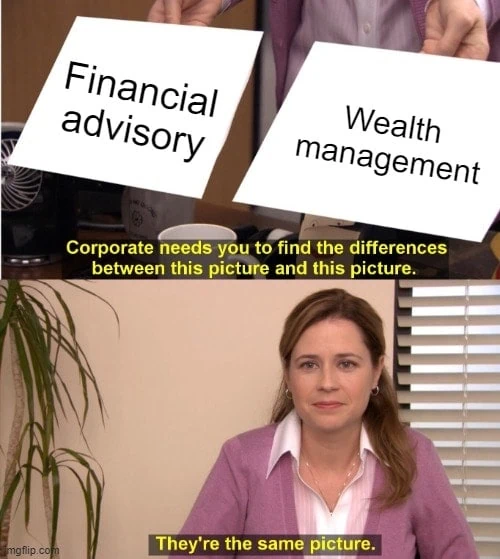Wealth Management Companies in Canada 2025
My article on the best financial advisors in Canada appears to have triggered a bit of a backlash from Canada’s wealth management companies.
If you’re not sure what exactly the difference is between a wealth management firm and a financial planning company – don’t worry – there isn’t one.
The terms “financial planning,” “financial advisor,” and “wealth management,” are all vague terms with little legal meaning in Canada. You could toss “asset management,” “money coaches,” and many other titles into that nebulous category as well.
Most wealth management companies in Canada would likely tell you the difference between their financial planning division and their wealth management division, is that the clients in wealth management have over a certain amount of money (say a million bucks).
By making an exclusive tier, with an exclusive-sounding name, it can make clients feel special.

What Is Wealth Management?
As I described above, wealth management is a term most often used to describe financial planning for people that range from being well-off to wealthy. It is synonymous with terms like “private wealth management” and “high-net-worth planning”. Often it will be combined with terms like “asset” and “tax optimization.”
All of those words are just marketing jargon to describe good financial planning. Good financial planning for people with a million dollars or more can be a bit more complex than good financial planning for people with less than a million – but the principles are pretty darn similar at the end of the day.
A good wealth management advisor should be thoroughly covering areas such as:
- How they are getting paid
- Your insurance needs
- Estate planning
- Retirement income strategies
- Tax planning
- Investment education (if needed)
- Optimized accumulation in registered and non-registered accounts
- Planning for drawdown of registered and non-registered
- Budgeting priorities
Our Recommended Private Wealth Advisors
Jason Heath, CFP
- Fee-only, advice-only planner
- Recognized financial expert across many Canadian publications
- 20+ Years of financial planning experience
- Founder of Objective Financial Partners
- Certified Financial Planner (CFP)
Ideal Clients: Canadian investors, executives, professionals, Canadians living abroad (expats), and retirees.
Focus: Comprehensive financial and retirement planning, personalized tax preparation, estate planning, Canadian expatriate financial plans, investment strategies, and insurance needs analysis.

Nancy Grouni, CFP, RRC
- Fee-only, advice-only planner
- Registered Retirement Consultant (RRC)
- Certified Financial Planner (CFP)
- 20+ Years of financial planning experience
- Part of Objective Financial Partners’ team
Ideal Clients: Canada small business owners, retirees with investment holding companies, high net worth individuals, medical and legal professionals.
Focus: Strategic financial and tax planning for business owners. Estate planning for those with non-registered accounts and holding companies. Complex financial tactics for high net worth individuals.

Best Wealth Management Companies in Canada
As FT wrote in his Edward Jones review, there is a massive gap when it comes to the large Canadian wealth management companies (that charge massive fees to fuel their massive ad budgets) and a fee-only, advice-only financial planner.
The inherent issue with a wealth management company charging you through commissions on the products it sells, is not unique to Edward Jones though. (They’re just the largest in Canada.)
Some of the other biggest Canadian wealth management companies are:
- Raymond James
- Investors Group (IG Wealth Management)
- RBC Wealth Management
- BMO Nesbitt Burns
- CIBC Wood Gundy
- TD Private Wealth Management
- ScotiaMcleod
- IA Private Wealth
- CI Financial (Assante Wealth Management)
- Wellington-Altus
- National Bank Financial Wealth Management
- CG Wealth Management
- Nicola Wealth
- Manulife Securities
- Richardson Wealth
- Harbourfront Wealth Management
While there are small differences between these companies, their commission-based models are quite similar. The bottom line is that their advisors make money by selling products to you – and much of the money they make is by taking an annual percentage out of your entire portfolio (leading to much-reduced long-term wealth).
Choosing the Right Wealth Management Company for You
If you’re looking for personalized help in getting the most out of your financial situation then I recommend not being swayed by a bunch of fancy marketing ideas and impressive-looking acronyms behind names. To be honest with you, none of that means much of anything.
The four questions to answer in order to guarantee the best financial planning help – whether that’s called plain old financial advising, financial planning, wealth management, high net worth planning, private wealth, or any other moniker – are:
- Are the individuals involved fee-only and advice-only financial planners?
- Does the wealth management company embrace a fiduciary duty towards clients?
- Are the advisors willing to fully explain their fees in easy-to-understand terms?
- Does the company and advisors recommend high-MER mutual funds?
Make sure to do your due diligence before making your final choice of who to work with. We’re not talking about selecting a personal shopper here, we’re talking about empowering someone to guide your entire financial well-being!
I should note that a common mistake I often see people make when it comes to selecting a wealth manager is to be swayed by how “nice” someone is. Look, working with nice people is a pleasant experience – definitely better than not nice! But always keep in mind that if someone gets paid based on the products that you buy and the amount of money that you invest with them, then they are a salesperson first and foremost.
Successful salespeople are always really good at making personal connections and being nice – that’s like the first day of Sales 101!
Your financial success will not be determined by fun small talk that makes you feel like you’ve made a friend. It will be determined by your ability to listen to impartial expert advice – and then implementing that advice. It quickly boils down to basic psychology and math. So then, it’s vitally important to work with someone that helps you tilt that psychology and math in your favour – not someone who is going to reach into your investment account each year and take a bunch of your money.
How Do Wealth Management Firms Make Money?
Companies like Objective Financial, Raymond James, Edward Jones, and the rest of Canada’s wealth management firms generally charge their clients in one of three ways:
Fee-Only, Advice-Only Wealth Management: This model is straightforward. Planners charge a set dollar amount for their advice. It’s the same idea as a quote from any other professional. The amount is paid one time. If you opt for regular meetings—annually or monthly—you’ll pay a predetermined fee each time. This model avoids any potential conflicts of interest from commissions, asset-based percentages, or any other sort of difficult-to-understand, distorted model.
Percentage Assets Under Management: Under this model, wealth management companies charge a consistent percentage of your portfolio each year, regardless of the investment types recommended. Even a relatively small percentage of your assets adds up in a hurry, and – while better than commission based wealth management – charging a percentage of AUM can lead to conflicted advice. For example, should I pay down debt or add to my portfolio? Only one of those options pays the company more.
Commission-Based Wealth Management: (Aka: “kickbacks for selling financial products wealth management.”) Unfortunately, the most prevalent payment method in Canada involves advisors earning commissions from the financial products they sell, such as mutual funds. This model can be costly and opaque, as fees are often deducted directly from investment accounts, making them hard to track, and even hard to understand.
The least complex and most transparent payment model—fee-only, advice-only—is ironically the rarest. This rarity persists despite the high costs and potential conflicts of interest present in more common models like commission-based structures, which can obscure the actual costs to investors through mechanisms like Management Expense Ratios (MERs). These are often much higher in Canada compared to other countries, potentially leading to significant financial losses over time.
Don’t listen to any financial professional out there that says something like, “Don’t worry my services are free to you,” or “no worries, the investment company pays me, so it costs you nothing.”
Run – don’t walk – away from these types of wealth management firms.
Canadian Wealth Management FAQ
I've Completed My Million Dollar Journey. Let Me Guide You Through Yours!
Sign up below to get a copy of our free eBook: Can I Retire Yet?




